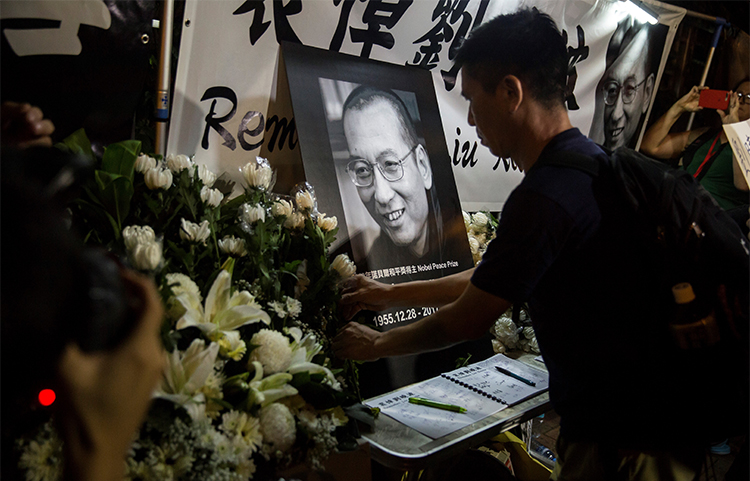I have no pity for Chinese President Xi Jinping, who dug himself into a deep public relations hole with the unnecessarily cruel treatment of China’s Nobel Laureate and political dissident, who died this week. Liu died of liver cancer in a Chinese hospital, after receiving medical parole in June from prison, where he was diagnosed with late-stage cancer. He asked to go overseas for treatment and to die in a free land, and China refused
President Xi faced a hard choice, but it was a dictator’s dilemma of his own making, of what’s worse: to let Liu die in China or show a little kindness and free him to go overseas to the same fate. Xi missed an opportunity. But there are plenty of others just waiting for him. Even for Xi, who has mounted an ever escalating campaign against freedom of expression, this was a terrible choice that only confirmed his global image as someone who is heartless.
Let’s be blunt. The Chinese people don’t matter here. China’s control over the internet and news distribution is so complete that few Chinese know what’s going on. Whether President Xi kept Liu locked away and isolated in a Chinese hospital ward, or freed him to go overseas, where he might have enjoyed a few days of free speech before the end, would not have had any measurable impact on Chinese public opinion. Most Chinese would never know.
The only audience that matters is outside of China, and Xi flubbed it.
As Liu Xiaobo fades, his hopes for reform in China are dying as well https://t.co/zyMTu2Vz9C
— The Guardian (@guardian) July 8, 2017
Surely, I’m not the only one moved to near tears at photographs of a frail-looking Liu with his almost equally frail-looking wife Liu Xia. One photo, in particular, conveys deep love and longing, Liu Xiaobo standing in blue striped pajamas, open at the neck, his eyes seeming to smile, his arm around Liu Xia, perhaps for support. Liu Xia looks up to him in a deeply loving gaze, her shaved head–shaved in protest since his sentencing to 11 years in prison on subversion charges in 2009–screaming devotion to him, and his cause of human rights and democracy. The stark image also speaks of her own suffering these past few years – struggling with isolation enforced by police, heart ailments and depression.
Liu’s death in China reinforced suspicions that China’s hiding something–that prison authorities denied Liu the medical care he needed when it could have made a difference, in effect executing a death sentence. Yet Xi’s refusal to let Liu travel overseas was both cruel and a show of weakness and cowardice. Was Xi so afraid of what Liu might have said beyond the reach of Chinese censors? Showing a bit of mercy–and courage–by letting him go could have helped to repair Xi’s badly damaged overseas image, just a little.
Unfortunately, Xi has many more opportunities to exercise his cruelty–or, conversely, to show mercy by assuring that other prisoners of conscience do not suffer the same fate in China’s gulag. There are many cases where China has been accused of denying health care to dissidents–too many to accept China’s denials that this happens.
So here’s some friendly advice for President Xi. Why don’t you start taking better care of dissidents in jail? For example, why not let imprisoned journalist and activist Huang Qi, founder of the human rights news site 64 Tianwang, see his doctor and assure the world that you are caring properly for his acute nephritis, a kidney disorder that if left untreated could lead to kidney failure?
After nearly seven months in prison in Mianyang City, Sichuan, kept in isolation by the police on charges of leaking state secrets, Huang’s mother and friends are worried sick. And while you are at it, why not let his lawyer in to see him? And maybe you can talk his mother’s former employer into releasing her pension payments and paying her medical bills which, according to an associate of Huang’s, are being withheld on the grounds that she’s related to a political offender.
Does China need to be this cruel? An associate of Huang’s at 64 Tianwang tells me they’ve met police 10 times to try to work something out, and to seek release on bail for humanitarian reasons, to no avail. I bet a nudge from the president of China would make a difference, quickly.
It would be nice if freedom and free speech could be granted to the 38 imprisoned Chinese journalists that the Committee to Project Journalists documented at the end of last year–one less now that Liu has died. But at the very least, China doesn’t need to be so heartless toward prisoners whose only offense has been to exercise free expression.
It’s too late for Liu Xiaobo, but perhaps his death creates an opportunity for President Xi and China to show a little kindness, at little cost. It would do China’s global image a world of good.
EDITOR’S NOTE: A version of this article was first published on Impact.Vice.com.
